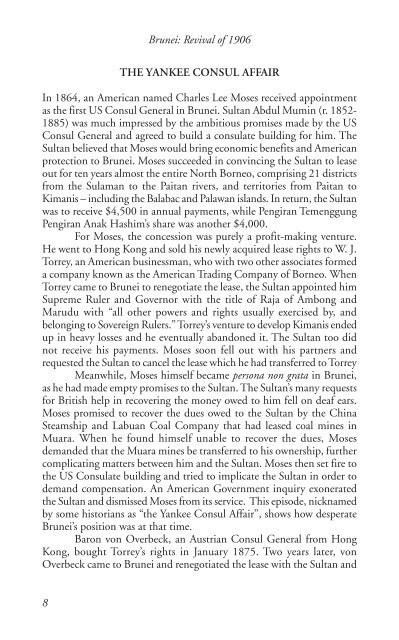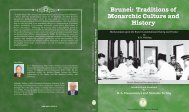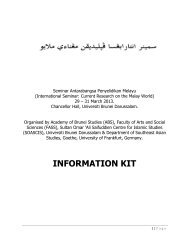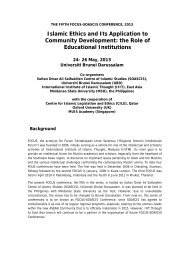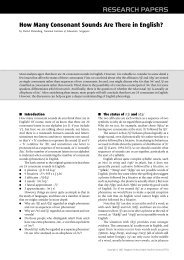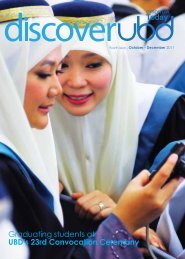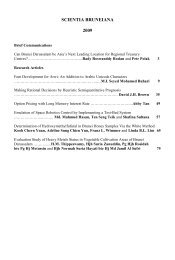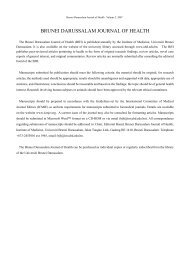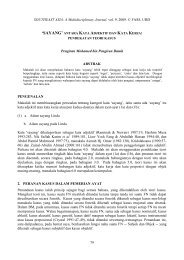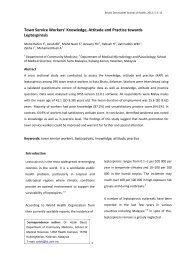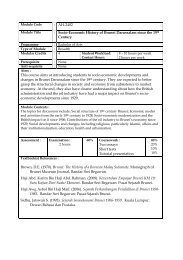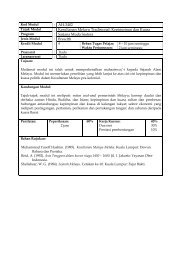cover single page - Universiti Brunei Darussalam
cover single page - Universiti Brunei Darussalam
cover single page - Universiti Brunei Darussalam
You also want an ePaper? Increase the reach of your titles
YUMPU automatically turns print PDFs into web optimized ePapers that Google loves.
<strong>Brunei</strong>: Revival of 1906<br />
THE YANKEE CONSUL AFFAIR<br />
In 1864, an American named Charles Lee Moses received appointment<br />
as the first US Consul General in <strong>Brunei</strong>. Sultan Abdul Mumin (r. 1852-<br />
1885) was much impressed by the ambitious promises made by the US<br />
Consul General and agreed to build a consulate building for him. The<br />
Sultan believed that Moses would bring economic benefits and American<br />
protection to <strong>Brunei</strong>. Moses succeeded in convincing the Sultan to lease<br />
out for ten years almost the entire North Borneo, comprising 21 districts<br />
from the Sulaman to the Paitan rivers, and territories from Paitan to<br />
Kimanis – including the Balabac and Palawan islands. In return, the Sultan<br />
was to receive $4,500 in annual payments, while Pengiran Temenggung<br />
Pengiran Anak Hashim’s share was another $4,000.<br />
For Moses, the concession was purely a profit-making venture.<br />
He went to Hong Kong and sold his newly acquired lease rights to W. J.<br />
Torrey, an American businessman, who with two other associates formed<br />
a company known as the American Trading Company of Borneo. When<br />
Torrey came to <strong>Brunei</strong> to renegotiate the lease, the Sultan appointed him<br />
Supreme Ruler and Governor with the title of Raja of Ambong and<br />
Marudu with “all other powers and rights usually exercised by, and<br />
belonging to Sovereign Rulers.” Torrey’s venture to develop Kimanis ended<br />
up in heavy losses and he eventually abandoned it. The Sultan too did<br />
not receive his payments. Moses soon fell out with his partners and<br />
requested the Sultan to cancel the lease which he had transferred to Torrey<br />
Meanwhile, Moses himself became persona non grata in <strong>Brunei</strong>,<br />
as he had made empty promises to the Sultan. The Sultan’s many requests<br />
for British help in re<strong>cover</strong>ing the money owed to him fell on deaf ears.<br />
Moses promised to re<strong>cover</strong> the dues owed to the Sultan by the China<br />
Steamship and Labuan Coal Company that had leased coal mines in<br />
Muara. When he found himself unable to re<strong>cover</strong> the dues, Moses<br />
demanded that the Muara mines be transferred to his ownership, further<br />
complicating matters between him and the Sultan. Moses then set fire to<br />
the US Consulate building and tried to implicate the Sultan in order to<br />
demand compensation. An American Government inquiry exonerated<br />
the Sultan and dismissed Moses from its service. This episode, nicknamed<br />
by some historians as “the Yankee Consul Affair”, shows how desperate<br />
<strong>Brunei</strong>’s position was at that time.<br />
Baron von Overbeck, an Austrian Consul General from Hong<br />
Kong, bought Torrey’s rights in January 1875. Two years later, von<br />
Overbeck came to <strong>Brunei</strong> and renegotiated the lease with the Sultan and<br />
8


